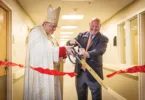For Lent, seek a deeper relationship with Jesus
by Joe Bollig
joe.bollig@theleaven.org
KANSAS CITY, Kan. — Odds are you’ve been asked this question before: Do you have a personal relationship with Christ?
Well, do you?
Although this question has frequently been the opening gambit of evangelical Protestant proselytizers, having “a personal relationship with Christ” is actually very Catholic.
Pope Benedict XVI told Filipino bishops in 2011 that their “great task in evangelization is therefore to propose a personal relationship with Christ as key to complete fulfillment.”
And during a general audience in June 2014, Pope Francis refined the thought further when he said, “our relationship with Christ is personal but not private; it is born of, and enriched by, the communion of the church.”
Archbishop Joseph F. Naumann, too, has repeatedly stressed the importance of developing a personal relationship with Christ.
Some people, however, struggle with this imperative.
Just what is “a personal relationship with Christ”? How do you get one? How do you know you have one?
As children, we’ve been taught if we went to Mass weekly, celebrate the sacrament of reconciliation occasionally, and prayed our prayers every morning and night, we were well on our way to heaven.
Now, it seems that it takes a little more.
In preparation for Lent, The Leaven invited Vince Eimer, spiritual and retreat director of Christ’s Peace House of Prayer near Easton to explain just exactly what is meant by having a “personal relationship with Christ.”
A real, live person
The place to start talking about this personal relationship is the Trinity.
“We believe God is a Trinity of persons,” said Eimer. “And one reason Jesus became incarnate was so God could reach us in a way that we could reach back. It was a way that he could connect with us so we could connect with him.”
To speak of developing a relationship with Jesus is to speak of developing a friendship as you would with any human being. Hopefully, that friendship would deepen into a relationship of love.
How do we start this relationship with Jesus? The same way we would with anyone, said Eimer.
“First, there is an attraction,” he said. “An attraction usually comes because there is some knowledge. So we need to come to know [him by asking,] ‘Who are you, Jesus?’”
So, you have to get to know Jesus.
How? By reading a bit of the Gospels every day.
“If you read the Gospels every day,” said Eimer, “you’ll see the depth in these very simple stories, because the Holy Spirit is active in these words. It is no ordinary book. It is filled with the life of God.
If you read them faithfully, you’ll connect with the actuality of Jesus.
Oh, say can you pray?
Once you get to know about Jesus, you need to start having a conversation with Jesus. This is prayer.
Many of us learned formal prayer by rote when we were children. These memorized prayers are an excellent place to begin. They cover the basics and prepare your heart for God, according to Eimer. When you pray rote prayers, do so with meaning. Don’t just read or say them.
Usually, as people mature in their spiritual life, they also learn other ways to pray and practice many kinds of prayer in their lives. This is progression in prayer.
Sometimes, however, people get stuck here — in effect, staying in the shallow end of the pool.
Eimer suggested practicing three more kinds of prayer to deepen your relationship with Jesus.
The first kind is the prayer of recollection.
“Start by realizing that Jesus is already with you — all the time, every day,” said Eimer. “Start talking to him as you would to a friend. . . . You recollect that ‘Jesus is here with me.’”
The second kind is praying with the Bible in a certain way: lectio divina, which is Latin for “divine reading.”
This ancient Benedictine method consists of four parts: reading, meditating, praying and contemplating — all done in that order.
“I would suggest with the Gospel of Mark,” said Eimer, “you begin reading the Gospel until a word or phrase speaks to you or jumps out at you, and then you stop. That’s where the Holy Spirit has led you.”
Then, “you repeat that word or phrase over and over,” he continued. “Maybe all sorts of thoughts will come into your head, but you just keep repeating. Eventually, there will come this peace or love of God in your heart. That’s what this exercise is meant to do. When it does, just stop and rest in that love. At that point, you’ve been led into contemplative prayer.”
A third kind is another form of contemplative prayer that uses the name of Jesus, the name above all names.
You sit calmly and simply say the name of Jesus as you breath in, and then exhale. And repeat. You may start only a few minutes but, before long, you might have to set an alarm clock to make sure you -aren’t late for work.
“Do this every day, at the same time, and don’t set a time limit,” said Eimer. “When you feel like you’re done, just stop. I guarantee you this will grow and you will notice a change in your interior life. This will happen as a result of this form of prayer. It just does.”
It makes sense, said Eimer. “Jesus” is the most powerful name in the universe. The power and graces associated with the name of Jesus are remarkable.
“I’ve done all three of these, and I know they are very powerful and effective,” said Eimer. “I used to be a typical layman. Into my 20s, going to Mass was pretty much my prayer life. I didn’t have much of a prayer life outside of that.”
“Eventually, the Lord touched me and I started doing these practices. And it totally changed me,” he continued. “Anybody can do these. I’ve seen many other people changed by these ways of connecting with the Lord.”
One more practice, in addition to a varied prayer life, should be fairly obvious: Frequent the sacraments.
As Pope Francis pointed out, “our relationship with Christ is personal but not private; it is born of, and enriched by, the communion of the church.”
The Catechism of the Catholic Church teaches: “The sacraments are efficacious signs of grace, instituted by Christ and entrusted to the Church, by which divine life is dispensed to us” (1131). The sacraments are, by their very nature, intimate and personal.
“You don’t have to worry about God having a relationship with you; he’s with you all the time,” said Eimer. “He always maintains contact with you. The Holy Spirit is always prompting you to do good.”
“The problem is: We need to keep up our connection to God,” he continued. “That’s why we pray, and use the sacraments — especially the sacraments. The graces there are, in a sense, guaranteed and are very powerful, much more than any form of prayer.”
The battle of prayer
Here’s a question many Christians ask: If God loves us so much and wants to have a personal relationship with us, why is prayer so hard?
Indeed. The catechism speaks of the “battle” of prayer: “Prayer is both a gift of grace and a determined response on our part” (2725).
Successful prayer — the means of keeping up our connection to God — requires that we discipline our time and our feelings, said Eimer.
Yes, you really do have the time. Keep track and you’ll be surprised.
But what about “feelings”? Sometimes people don’t feel like praying — they feel like they have to be “in the mood.”
“There are times when you don’t feel like praying,” said Eimer. “Like anything in life when you want to be successful, you need discipline.”
“The point of all this is: Prayer is not about feelings on that level,” he continued. “At that point, our faith is about the will.”
The will in this context is about a person’s capacity to make choices. A person may not feel like praying, but he or she chooses to pray. This is very special and powerful.
“Love is about the will, how you choose to do the good for someone,” said Eimer. “Prayer is the same way. I may not feel like praying today, but I choose to be with God even though my emotions make me feel like doing something else.”
“What we have here is the prayer of faith, which is the most powerful prayer,” he added. “You pray because you believe God is present and you want to give God your time, even though you may be bored or restless.”
Of course, prayer can be a very emotional experience. There’s nothing wrong with this. Emotions are part of who and what we are, and they are part of our prayer. Prayer, however, is not all about us. It’s about uniting ourselves to God and God’s will.
Good news: It gets better
Does this mean that prayer will always be difficult, always a battle?
No, said Eimer. Everyone has the capacity to receive God’s grace and cooperate with it. Everyone has the potential to be a saint.
And prayer does indeed become easier as our relationship with God — Father, Son and Holy Spirit — becomes deeper and more personal.
“Have hope; always have hope,” said Eimer. “If you have any desire for God at all, that’s coming from the Holy Spirit within you. That in itself is a sign God is working now in you, and you should have great hope in that and great patience. Don’t beat yourself up [thinking,] ‘I’m not doing enough.’ That dissatisfaction is a sure sign of the Holy Spirit bubbling within you.”
“People need to have hope and great confidence in how much God loves them,” said Eimer, “and they need to have great faith that he’s taking care of them — in his time.
“Five years from now, you’ll be really different, because you’re giving yourself to God now. But he doesn’t take you faster than you can bear.”






